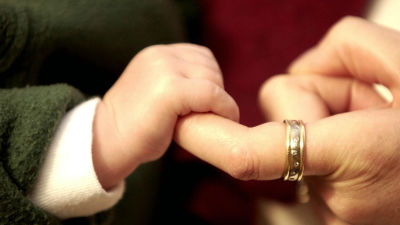Call for sperm and egg donors to be identifiable after the birth of a child as part of law changes

Children born via sperm or egg donation may not need to wait until they reach adulthood to find out information about their biological parents, under proposed changes to fertility treatments in the UK.
The Human Fertilisation and Embryology Authority (HFEA) said it is tabling the measures to help better reflect modern attitudes and expectations in society.
Existing legislation for the sector, which is 30 years old, has been described as outdated by some experts, while the HFEA said the Human Fertilisation and Embryology Act is "silent on patient care".
So, what exactly is being proposed and how would the changes work?
What changes are being sought?
The HFEA wants to make the following amendments to the law:
To open up the possibility of children, born via sperm or egg donation, discovering information about their biological parents before reaching the age of 18;
For the HFEA to be given more power to regulate "add on" treatments - the optional extras offered by some clinics that can cost patients thousands of pounds;
New powers for the HFEA to fine poorly performing clinics;
Patient records to be shared between GPs and fertility clinics.
Why does the HFEA want to make changes?
At present, donor-conceived children cannot obtain information about their biological parents until they are 18.
But the HFEA wants to adjust that by giving parents the choice at the point of treatment as to whether they would like to choose a donor who is identifiable before or after their future child turns 18.
In relation to so-called "add on" treatments, some fertility clinics currently point patients to sister companies, which offer health, wellness and dietary advice.
Want a quick and expert briefing on the biggest news stories? Listen to our latest podcasts to find out What You Need To Know
The HFEA has proposed to have greater power in this area to crack down on clinics which fail to provide information about the evidence for, or risks associated with, treatment add-ons.
Last year, the Competition and Markets Authority warned that add-ons can cost up to £2,500 per cycle and, as such, the HFEA has called for the ability to take "proportionate action where patient safety is at risk".
In addition, the HFEA wants to be able to fine inadequately performing clinics as its current range of sanctions are "limited".
What has the HFEA said?
HFEA chairwoman Julia Chain said: "Much of the fertility law has stood the test of time remarkably well but modern fertility practice, emerging possibilities in research that could benefit patients and the changing expectations of donors and of families, are not reflected in the sector’s 30-year-old law.
"The HFE Act is the cornerstone of fertility regulation enforced by the HFEA to ensure clinics provide services to patients that are safe and of a high standard; we are uniquely positioned to see where the law works well and where it doesn't."
She added: "There is great care being offered in both the NHS and private sector.
"But the enforcement powers we currently have - suspending or removing a licence - are too slow and blunt.
"We need a more agile and gradual approach like other regulators which help shape clinic behaviour and address serious non-compliance quickly."
How has the government responded?
A Department of Health and Social Care (DHSC) spokesman said: "We recognise parts of the Human Fertilisation and Embryology Act are in need of modernisation.
"As a first step, we have asked the HFEA to undertake a stakeholder consultation about the priorities for reform, which we look forward to reviewing once complete."
The HFEA consultation opened on February 28 and will run for six weeks on the regulator's website. It will submit its recommendations for law changes to the DHSC by the end of the year.